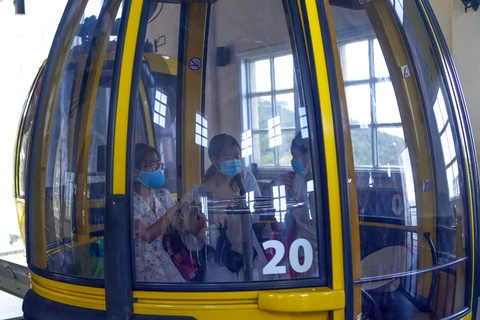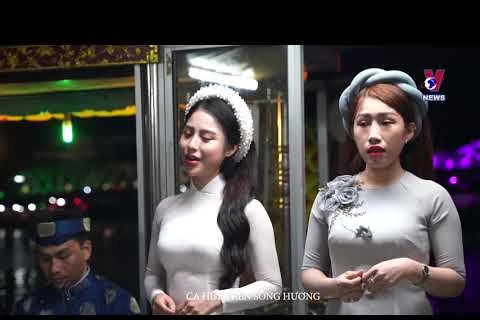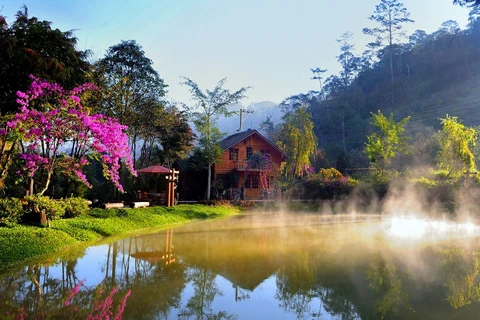 Cuu village is a quaint beauty of Hanoi, where you can find traditional values and you become immersed in the nostalgic feelings. The houses in the village of Cuu are a mixture of two Asian and European styles, magnificent and popular; generosity, peace in harmony. Through many ups and downs of time, Cuu village in Hanoi still has nostalgic architectural values as a symbol of prosperity, once known by the title "Ha Thanh first tailor village". Cuu village would be an interesting destination for tourists to go back in time. The 500-yeaer-old village is located about 40 km from the center of Hanoi. (Photo: PV/Vietnam+)
Cuu village is a quaint beauty of Hanoi, where you can find traditional values and you become immersed in the nostalgic feelings. The houses in the village of Cuu are a mixture of two Asian and European styles, magnificent and popular; generosity, peace in harmony. Through many ups and downs of time, Cuu village in Hanoi still has nostalgic architectural values as a symbol of prosperity, once known by the title "Ha Thanh first tailor village". Cuu village would be an interesting destination for tourists to go back in time. The 500-yeaer-old village is located about 40 km from the center of Hanoi. (Photo: PV/Vietnam+) Cuu village, Van Tu commune, Phu Xuyen district is located about 40 kilometers from the center of Hanoi. This ancient village is famous for its ancient villas mixed with Vietnamese and French architecture, built in the early twentieth century.
Many people call Cuu village the "Western village", because the village's architecture is perhaps different and outstandingly beautiful compared to the familiar old villages of the North.
During the period from 1920 - 1945, dozens of "villas" of Cuu village were built with arched architecture, flowing roof, ironwood, ... Small details in the house are often decorated with flowers, crane, phoenix.
The architecture of the old houses here, going through many ups and downs in time, still retains the ancient and luxurious features hidden behind the yin-yang, red tile roofs combined with delicate carvings and arches.
Old people nowadays are mostly attached to agriculture and live in the old village that will be soon forgotten over the years.
 The architecture is purely East Asian, but the old village is compared to "the Western village of Ha Thanh land". Cuu village was set up over 500 years ago. This ancient village is famous for its ancient villas mixed with Vietnamese and French architecture, built in the early twentieth century. Many people call Cuu village the "West village", because the village's architecture is perhaps different and outstandingly beautiful compared to the familiar old villages of the North. Many people still live in old houses of over 100 years old in Cuu Village. However, there are a few abandoned French villas without owners. The abandoned houses are now covered with moss, full of dry leaves in the garden, bare walls and closed gates. When sun rays sparkle, all the space becomes brighter. (Photo: PV/Vietnam+).
The architecture is purely East Asian, but the old village is compared to "the Western village of Ha Thanh land". Cuu village was set up over 500 years ago. This ancient village is famous for its ancient villas mixed with Vietnamese and French architecture, built in the early twentieth century. Many people call Cuu village the "West village", because the village's architecture is perhaps different and outstandingly beautiful compared to the familiar old villages of the North. Many people still live in old houses of over 100 years old in Cuu Village. However, there are a few abandoned French villas without owners. The abandoned houses are now covered with moss, full of dry leaves in the garden, bare walls and closed gates. When sun rays sparkle, all the space becomes brighter. (Photo: PV/Vietnam+).  Sunlight highlights the unique architecture of Cuu village. The time in the Cuu Village seems slower. Cuu Village has a quaint beauty, where you can find traditional values and become immersed in nostalgic feelings. Cuu Village is also where photographers and those with great passion for art unwind with the ancient inspiration of this land. You can even chat with local people to hear the old stories and learn about the years of prosperity before. Cuu Village would be an interesting destination for tourists to go back in time. The 500-yeaer-old village is located about 40 km from the center of Hanoi. (Photo: PV/Vietnam+)
Sunlight highlights the unique architecture of Cuu village. The time in the Cuu Village seems slower. Cuu Village has a quaint beauty, where you can find traditional values and become immersed in nostalgic feelings. Cuu Village is also where photographers and those with great passion for art unwind with the ancient inspiration of this land. You can even chat with local people to hear the old stories and learn about the years of prosperity before. Cuu Village would be an interesting destination for tourists to go back in time. The 500-yeaer-old village is located about 40 km from the center of Hanoi. (Photo: PV/Vietnam+)  Cuu village has a quiet beauty in the afternoon. During the period from 1920 - 1945, dozens of "villas" of Cuu village were built with arched architecture, flowing roof, ironwood, ... Small details in the house are often decorated with flowers, crane, phoenix. The architecture of the old houses here, going through many ups and downs in time, still retains the ancient and luxurious features hidden behind the yin-yang, red tile roofs combined with delicate carvings and arches. Old people nowadays are mostly attached to agriculture and live in the old village that will be soon forgotten over the years. The golden age of the Cuu Village was a long time ago, but we always feel the bustling, wealth of the “Tailor Village of Hanoi”. (Photo: PV/Vietnam+)
Cuu village has a quiet beauty in the afternoon. During the period from 1920 - 1945, dozens of "villas" of Cuu village were built with arched architecture, flowing roof, ironwood, ... Small details in the house are often decorated with flowers, crane, phoenix. The architecture of the old houses here, going through many ups and downs in time, still retains the ancient and luxurious features hidden behind the yin-yang, red tile roofs combined with delicate carvings and arches. Old people nowadays are mostly attached to agriculture and live in the old village that will be soon forgotten over the years. The golden age of the Cuu Village was a long time ago, but we always feel the bustling, wealth of the “Tailor Village of Hanoi”. (Photo: PV/Vietnam+)  The house over the years still retains somewhat of the ancient features. Many people call Cuu village the "Western village", because the village's architecture is perhaps different and outstandingly beautiful compared to the familiar old villages of the North. During the period from 1920 - 1945, dozens of "villas" of Cuu village were built with arched architecture, flowing roof, ironwood, ... Small details in the house are often decorated with flowers, crane, phoenix.The architecture of the old houses here, going through many ups and downs in time, still retains the ancient and luxurious features hidden behind the yin-yang, red tile roofs combined with delicate carvings and arches.Old people nowadays are mostly attached to agriculture and live in the old village that will be soon forgotten over the years. (Photo: PV/Vietnam+)
The house over the years still retains somewhat of the ancient features. Many people call Cuu village the "Western village", because the village's architecture is perhaps different and outstandingly beautiful compared to the familiar old villages of the North. During the period from 1920 - 1945, dozens of "villas" of Cuu village were built with arched architecture, flowing roof, ironwood, ... Small details in the house are often decorated with flowers, crane, phoenix.The architecture of the old houses here, going through many ups and downs in time, still retains the ancient and luxurious features hidden behind the yin-yang, red tile roofs combined with delicate carvings and arches.Old people nowadays are mostly attached to agriculture and live in the old village that will be soon forgotten over the years. (Photo: PV/Vietnam+)  A small gate passing through two houses owned by the same owner. The balcony of the house was not part of the traditional architecture of the Northern villages. During the period from 1920 - 1945, dozens of "villas" of the old village were built with arched architecture, flowing roof, ironwood, ... Small details in the house are often decorated with flowers, crane, phoenix. The architecture of the old houses here, going through many ups and downs in time, still retains the ancient and luxurious features hidden behind the yin-yang, red tile roofs combined with delicate carvings and arches. Old people nowadays are mostly attached to agriculture and live in the old village that will be soon forgotten over the years. (Photo: PV/Vietnam+)
A small gate passing through two houses owned by the same owner. The balcony of the house was not part of the traditional architecture of the Northern villages. During the period from 1920 - 1945, dozens of "villas" of the old village were built with arched architecture, flowing roof, ironwood, ... Small details in the house are often decorated with flowers, crane, phoenix. The architecture of the old houses here, going through many ups and downs in time, still retains the ancient and luxurious features hidden behind the yin-yang, red tile roofs combined with delicate carvings and arches. Old people nowadays are mostly attached to agriculture and live in the old village that will be soon forgotten over the years. (Photo: PV/Vietnam+)  The whole village of Cuu now has more than ten old villas. The rest have been fixed into modern houses. Cuu village has a quiet beauty in the afternoon. Cuu village, Van Tu commune, Phu Xuyen district, located about 40 kilometers from the center of Hanoi, has been around for over 500 years. This ancient village is famous for its ancient villas mixed with Vietnamese and French architecture, built in the early twentieth century. Many people call Cuu village the "West village", because the village's architecture is perhaps different and outstandingly beautiful compared to the familiar old villages of the North. (Photo: PV/Vietnam+)
The whole village of Cuu now has more than ten old villas. The rest have been fixed into modern houses. Cuu village has a quiet beauty in the afternoon. Cuu village, Van Tu commune, Phu Xuyen district, located about 40 kilometers from the center of Hanoi, has been around for over 500 years. This ancient village is famous for its ancient villas mixed with Vietnamese and French architecture, built in the early twentieth century. Many people call Cuu village the "West village", because the village's architecture is perhaps different and outstandingly beautiful compared to the familiar old villages of the North. (Photo: PV/Vietnam+)  Some rundown houses still have intact walls. Cuu village has a quiet beauty in the afternoon. Cuu village, Van Tu commune, Phu Xuyen district, located about 40 kilometers from the center of Hanoi, has been around for over 500 years. This ancient village is famous for its ancient villas mixed with Vietnamese and French architecture, built in the early twentieth century. Many people call Cuu village the "West village", because the village's architecture is perhaps different and outstandingly beautiful compared to the familiar old villages of the North. During the period from 1920 - 1945, dozens of "villas" of Cuu village were built with arched architecture, flowing roof, ironwood, ... Small details in the house are often decorated with flowers, crane, phoenix. (Photo: PV/Vietnam+)
Some rundown houses still have intact walls. Cuu village has a quiet beauty in the afternoon. Cuu village, Van Tu commune, Phu Xuyen district, located about 40 kilometers from the center of Hanoi, has been around for over 500 years. This ancient village is famous for its ancient villas mixed with Vietnamese and French architecture, built in the early twentieth century. Many people call Cuu village the "West village", because the village's architecture is perhaps different and outstandingly beautiful compared to the familiar old villages of the North. During the period from 1920 - 1945, dozens of "villas" of Cuu village were built with arched architecture, flowing roof, ironwood, ... Small details in the house are often decorated with flowers, crane, phoenix. (Photo: PV/Vietnam+)  In the mid-twentieth century, French architecture was prevailing in big cities such as Hanoi, Hai Phong ...About 40km from Hanoi center lies the 500-year-old village which is famous for its ancient villas built in a mixed Vietnamese - French architecture style in the early twentieth century. Many people still live old houses of over 100 years ago in the Cuu Village. However, there are a few abandoned French villas without owners. The abandoned houses are now covered with moss, full of dry leaves in the garden, bare walls and closed gates. When sun rays sparkle, all the space becomes brighter in the nick of time. Besides, Cuu Village is also where photographers, the young being of great passion for art are to unwind with the ancient inspiration of this land. You can even chat and share with the local people to hear the old story and learn about the years of prosperity before. (Photo: PV/Vietnam+)
In the mid-twentieth century, French architecture was prevailing in big cities such as Hanoi, Hai Phong ...About 40km from Hanoi center lies the 500-year-old village which is famous for its ancient villas built in a mixed Vietnamese - French architecture style in the early twentieth century. Many people still live old houses of over 100 years ago in the Cuu Village. However, there are a few abandoned French villas without owners. The abandoned houses are now covered with moss, full of dry leaves in the garden, bare walls and closed gates. When sun rays sparkle, all the space becomes brighter in the nick of time. Besides, Cuu Village is also where photographers, the young being of great passion for art are to unwind with the ancient inspiration of this land. You can even chat and share with the local people to hear the old story and learn about the years of prosperity before. (Photo: PV/Vietnam+)  Cuu village (Van Tu commune, Phu Xuyen district) is sometimes called "the Western village" because of its unique and outstanding architecture, comparing to other typical Vietnam's northern old villages. This construction took place in the years 1920-1945 with arched architecture, flowing roof, ironwood. Small details in each villa are elaborately carved. Though underwent numerous ups and downs, Cuu Village's houses still retain the ancient and luxurious features hidden behind the yin and yang tile roofs, combined with carvings and intricate arches. In the period from 1920 to 1945, dozens of Cuu Village "villas" were built with arch-shaped architecture, flowing roofs, ironwood,... The small details in those houses were often intricately carved with flowers, cranes, and phoenixes. (Photo: PV/Vietnam+)
Cuu village (Van Tu commune, Phu Xuyen district) is sometimes called "the Western village" because of its unique and outstanding architecture, comparing to other typical Vietnam's northern old villages. This construction took place in the years 1920-1945 with arched architecture, flowing roof, ironwood. Small details in each villa are elaborately carved. Though underwent numerous ups and downs, Cuu Village's houses still retain the ancient and luxurious features hidden behind the yin and yang tile roofs, combined with carvings and intricate arches. In the period from 1920 to 1945, dozens of Cuu Village "villas" were built with arch-shaped architecture, flowing roofs, ironwood,... The small details in those houses were often intricately carved with flowers, cranes, and phoenixes. (Photo: PV/Vietnam+)  Many old houses in the village have been degraded, young people often move to other places to live. Cuu village in Van Tu commune, Phu Xuyen district, is located about 40 kilometers from the center of Hanoi, It was set up over 500 years ago. In the period from 1920 to 1945, dozens of Cuu Village "villas" were built with arch-shaped architecture, flowing roofs, ironwood,... The small details in those houses were often intricately carved with flowers, cranes, and phoenixes. Nowadays, people in Cuu village mostly engage in farming and continue living in the ancient village that was soon forgotten over the years. (Photo: PV / Vietnam+)
Many old houses in the village have been degraded, young people often move to other places to live. Cuu village in Van Tu commune, Phu Xuyen district, is located about 40 kilometers from the center of Hanoi, It was set up over 500 years ago. In the period from 1920 to 1945, dozens of Cuu Village "villas" were built with arch-shaped architecture, flowing roofs, ironwood,... The small details in those houses were often intricately carved with flowers, cranes, and phoenixes. Nowadays, people in Cuu village mostly engage in farming and continue living in the ancient village that was soon forgotten over the years. (Photo: PV / Vietnam+)  At present, there are mostly young children and the old living in the village. The time in the Cuu Village seems slower. Cuu Village has a quaint beauty, where you can find traditional values and become immersed in nostalgic feelings. Cuu Village is also where photographers and those with great passion for art unwind with the ancient inspiration of this land. You can even chat with local people to hear the old stories and learn about the years of prosperity before. Cuu Village would be an interesting destination for tourists to go back in time. The golden age of the Cuu Village was a long time ago, but we always feel the bustling, wealth of the “Tailor Village of Hanoi”. (Photo: PV / Vietnam+)
At present, there are mostly young children and the old living in the village. The time in the Cuu Village seems slower. Cuu Village has a quaint beauty, where you can find traditional values and become immersed in nostalgic feelings. Cuu Village is also where photographers and those with great passion for art unwind with the ancient inspiration of this land. You can even chat with local people to hear the old stories and learn about the years of prosperity before. Cuu Village would be an interesting destination for tourists to go back in time. The golden age of the Cuu Village was a long time ago, but we always feel the bustling, wealth of the “Tailor Village of Hanoi”. (Photo: PV / Vietnam+)  Ms. Thien, a villager, said: "Our children have gone to work far away from home. We stay together at home, sometimes they come back once for a day or two". Cuu Village is an ancient village of Hanoi, in Van Tu Commune, Phu Xuyen District. It is about 40 km of Hanoi. Entering the village entrance, an ancient and nostalgic world opens, attracting visitors into a quiet and peaceful land unlike the bustling town which has noisy and crowded passers-by. Many people still live old houses of over 100 years ago in the Cuu Village. However, there are a few abandoned French villas without owners. The abandoned houses are now covered with moss, full of dry leaves in the garden, bare walls and closed gates. When sun rays sparkle, all the space becomes brighter in the nick of time. (Photo: PV/Vietnam+)
Ms. Thien, a villager, said: "Our children have gone to work far away from home. We stay together at home, sometimes they come back once for a day or two". Cuu Village is an ancient village of Hanoi, in Van Tu Commune, Phu Xuyen District. It is about 40 km of Hanoi. Entering the village entrance, an ancient and nostalgic world opens, attracting visitors into a quiet and peaceful land unlike the bustling town which has noisy and crowded passers-by. Many people still live old houses of over 100 years ago in the Cuu Village. However, there are a few abandoned French villas without owners. The abandoned houses are now covered with moss, full of dry leaves in the garden, bare walls and closed gates. When sun rays sparkle, all the space becomes brighter in the nick of time. (Photo: PV/Vietnam+)  Many villas are in French style, but Cuu village still retains Asian-style architecture with winding alleys. Many people call Cuu village the "West village", because the village's architecture is perhaps different and outstandingly beautiful compared to the familiar old villages of the North. Going around Cuu village, suddenly you will hear the sound of rustling bamboo brooms, barking dogs and the slight wind. Walking around the blue stone path, narrow alleys of the Cuu village, we not only feel peaceful, calm but also mixed with an ancient and taciturn style. Quiet space also makes the atmosphere gloomy. The golden age of the Cuu village was a long time ago, but somewhere we always feel the bustling, wealth of “Tailor Village of Hanoi”. The time in the Cuu Village seems slower as if it remained the roof of the ancient values in this land. (Photo: PV / Vietnam+)
Many villas are in French style, but Cuu village still retains Asian-style architecture with winding alleys. Many people call Cuu village the "West village", because the village's architecture is perhaps different and outstandingly beautiful compared to the familiar old villages of the North. Going around Cuu village, suddenly you will hear the sound of rustling bamboo brooms, barking dogs and the slight wind. Walking around the blue stone path, narrow alleys of the Cuu village, we not only feel peaceful, calm but also mixed with an ancient and taciturn style. Quiet space also makes the atmosphere gloomy. The golden age of the Cuu village was a long time ago, but somewhere we always feel the bustling, wealth of “Tailor Village of Hanoi”. The time in the Cuu Village seems slower as if it remained the roof of the ancient values in this land. (Photo: PV / Vietnam+)  The beautiful, peaceful lotus pond and the alleys make Cuu village more ancient and poetic. The image of a former prosperous village in the past is still hidden nowhere even though the color of time has tainted the village. Many people call Cuu village the "West village", because the village's architecture is perhaps different and outstandingly beautiful compared to the familiar old villages of the North. Many people still live in old houses of over 100 years old in Cuu Village. However, there are a few abandoned French villas without owners. The abandoned houses are now covered with moss, full of dry leaves in the garden, bare walls and closed gates. When sun rays sparkle, all the space becomes brighter. (Photo: PV / Vietnam+)
The beautiful, peaceful lotus pond and the alleys make Cuu village more ancient and poetic. The image of a former prosperous village in the past is still hidden nowhere even though the color of time has tainted the village. Many people call Cuu village the "West village", because the village's architecture is perhaps different and outstandingly beautiful compared to the familiar old villages of the North. Many people still live in old houses of over 100 years old in Cuu Village. However, there are a few abandoned French villas without owners. The abandoned houses are now covered with moss, full of dry leaves in the garden, bare walls and closed gates. When sun rays sparkle, all the space becomes brighter. (Photo: PV / Vietnam+) 























